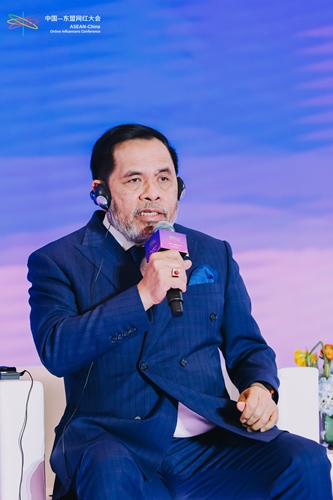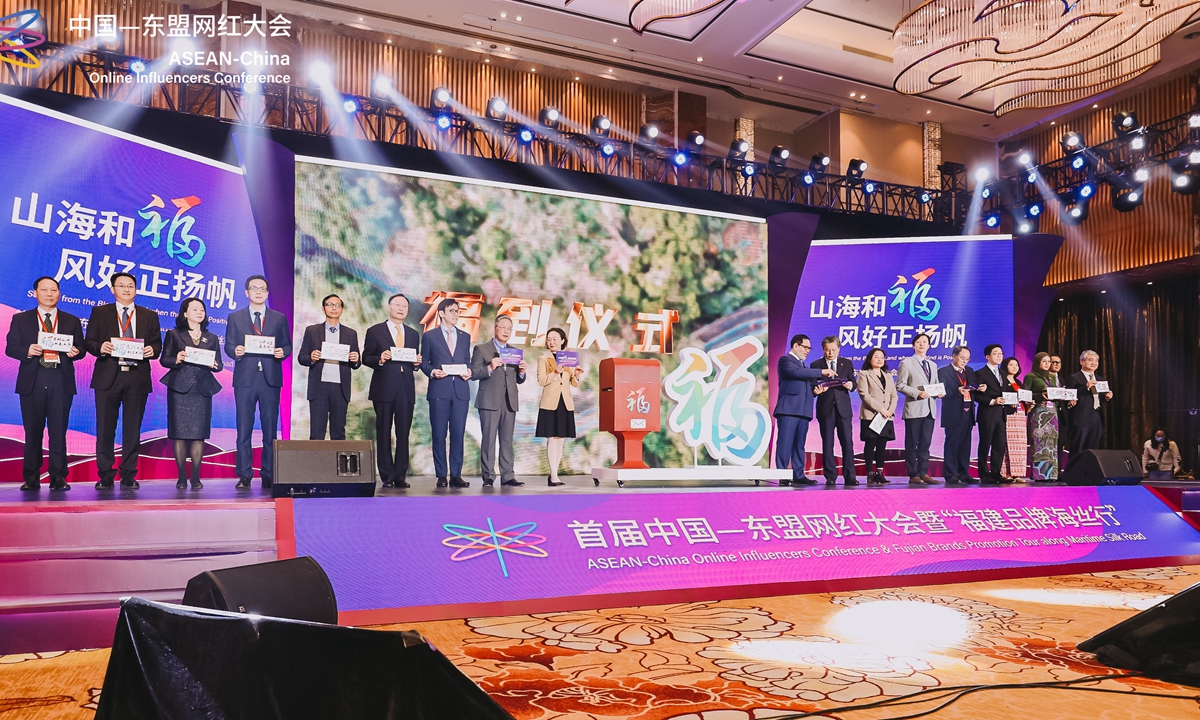Online Influencers Conference highlights close ties between China and ASEAN

Djauhari Oratmangun, ambassador of Indonesia to China Photo: Courtesy of the Online Influencers Conference

The opening ceremony of the ASEAN-China Online Influencers Conference Photo: Courtesy of the Online Influencers Conference
Cake from Vietnam, coconuts from Malaysia, sandwich crackers from the Philippines... a number of livestreamers, mostly students from overseas studying in China, were promoting products from ASEAN countries to consumers in front of small screens during the ASEAN-China Online Influencers Conference in Fuzhou, East China's Fujian Province.
Taking the theme "Set Sail from Blessed Land when the Wind is Positive," the first ASEAN-China Online Influencers Conference and Fujian Brands Promotion Tour along the Maritime Silk Road was held from Tuesday to Thursday, a year after China and ASEAN celebrated the 30th anniversary of the establishment of dialogue and elevated their ties to a comprehensive strategic partnership. The event also followed the implementation of the Regional Comprehensive Economic Partnership (RCEP), the world's largest free trade deal, which will bring new development opportunities to the China-ASEAN ties.
Mutually beneficial
ASEAN diplomats in China and Chinese and ASEAN online influencers learned about Fuzhou's experience in developing the digital industry and experienced the culture of Fujian Province through field visits and online activities during the three-day event.
Benjamin Sukanjanajtee, minister of the Thai Embassy in China, told the Global Times that his life was deeply changed by China's booming online economy after being relocated to the country a year ago.
Sukanjanajtee said he was impressed by what students from ASEAN countries were doing through livestreaming, such as selling products made in their own countries at the Sea Lion Intelligence Center in Fuzhou.
"It is a new trend and a new normal for this generation," he said.
"It is out of the traditional way of selling and buying things. You do not have to go through a middleman but directly sell to customers. This changing trend is also taking place in Thailand," Sukanjanajtee remarked.
Djauhari Oratmangun, ambassador of Indonesia to China, pointed to Indonesia's famous prawn cracker brand Papatonk, which sold more than $2.5 million prawn crackers in less than six minutes with the support of Chinese influencer Li Jiaqi on Taobao, saying "Can you imagine the potential of Chinese Influencers for other aspects of tourism, culture and economy? I believe it's massive!"
Cultural ambassadors
Internet celebrities and influencers promote trade and also bring a positive perspective to the audience, which can "strengthen people-to-people exchanges and cooperation," Djauhari Oratmangun told the Global Times.
"There needs to be a bridge or forum that connects Chinese influencers with other influencers in the world. I think this forum is among the first to build bridges between influencers of ASEAN and China."
Besides the three dialogues on the digital economy, influencer economy and cross-border e-commerce, the event also acted as a matchmaker between Chinese and ASEAN enterprises. The Fujian Asia-Pacific Economic and Trade Cooperation Promotion Association, China's first provincial-level business association responding to the RCEP agreement, and set the stage for a series of agreements between Chinese and ASEAN industries, including a $5.6 billion intended deal inked by Fujian's Eversun Holdings Group to invest in an ASEAN refinery.
Online influencers from both China and ASEAN countries shared their own stories and set up ties with global followers. Ms Yeah, a vlogger who has over 10 million followers on YouTube, mostly from ASEAN countries, shared how she connected with them through China's rich food culture.
"It is amazing to see that the element of food can connect people with different languages and different cultures from different countries," she said.
ASEAN online influencers like Rano Iskandar from Brunei, Cambodia's Seaneang, and Haoren from Malaysia also joined the dialogue through video conferencing.
The event will be made regular in the years to come, so as to guide and promote practical cooperation between China and ASEAN countries, as well as the people-to-people bonds among them. As China's first large forum joined by senior government officials, scholars and online influencers, the event was co-sponsored by the ASEAN-China Centre, Global Times Online, Department of Commerce of Fujian Province, Foreign Affairs Office of the People's Government of Fujian Province, and Fuzhou Municipal People's Government. It was supported by China Public Diplomacy Association and Mission of the People's Republic of China to ASEAN, and co-organized by Fujian Asia-Pacific Economic and Trade Cooperation Promotion Association.
Next: People hang lanterns for upcoming Spring Festival in Malaysia
Related Reading
- Hurricane Otis unleashes massive flooding in Acapulco, triggers landslides before dissipating
- Smart Living in Forest City: Crafting a New Experience for Comfort and Business
- Xi Jinping: China is willing to work with Russia to inject stability into a turbulent world
- Scene of the crime
- US ropes in Quad allies to fight ‘two-front wars’ with China and Russia despite spent force
- China Overseas Development Association Holds Press Conference of the 14th China Overseas Investment
- DILG: No vax exemption cards
- Malaysian island spearheads green palm oil revolution
- Amazon nearing climate ‘tipping point’ faster than expected
- Ireland PM tests positive for COVID-19 in Washington
